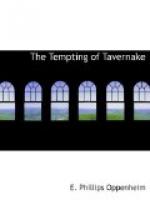“Father,” Beatrice interrupted, “let us talk about yourself. Don’t you think you would be more contented, happier, if you were to try to arrange for a few—a few demonstrations or lectures over here, as you at first intended? I know that you must find having nothing to do such a strain upon you,” she added.
It was perhaps by accident that her eyes were fixed upon the glass which the professor was carrying to his lips. He set it down at once.
“My child,” he said, in a low tone, " I understand you.”
“No, no,” she insisted, “I didn’t mean that, but you are always better when you are working. A man like you,” she went on, a little wistfully, “should not waste his talents.”
He sighed.
“You are perhaps right, my child,” he admitted. “I will go and see my agents to-morrow. Up till now,” he went on, “I have refused all offers. I have felt that Elizabeth, the care of Elizabeth in her peculiar position, demanded my whole attention. Perhaps you are right. Perhaps I have over-estimated the necessity of being constantly at her right hand. She is a very clever woman Elizabeth,” he concluded, “very clever indeed.”
“Where is she now, father?” Beatrice asked.
“She motored into the country early this morning with some friends,” the professor said. “They went to a party last night with Walter Crease, London correspondent to the New York Gazette,” he explained, turning a little away from Tavernake. “They were all home very late, I understand, and Elizabeth complained of a headache this morning. Personally, I regret to say that I was not up when they left.”
Beatrice leaned quite close to her father.
“Do you see anything of the man Pritchard?” she inquired.
The professor was suddenly flabby. He set down his glass, spilling half its contents. He stole a quick glance at Tavernake.
“My child,” he exclaimed, “you ought to consider my nerves! You know very well that the sudden mention of any one whom I dislike so intensely is bad for me. I am surprised at you, Beatrice. You show a culpable lack of consideration for my infirmities.”
“I am sorry, father,” she whispered, “but is he here?”
“He is,” the professor admitted. “Between ourselves,” he added, a white, scared look upon his pale face, “he is spoiling my whole peace of mind. My enjoyment of the comforts which Elizabeth is able to provide for me is interfered with by that man’s constant presence. He seldom speaks, and yet he seems always to be watching. I do not trust him, Beatrice. I am a judge of men and I tell you that I do not trust him.”
“I wish that Elizabeth would go away,” Beatrice said in a low tone. “Of course, I have no right—to say things. Nothing serious has perhaps ever happened. And yet—and yet, for her own sake, I do not think that she should stay here in London with Pritchard close at hand.”




